Physical Address
304 North Cardinal St.
Dorchester Center, MA 02124
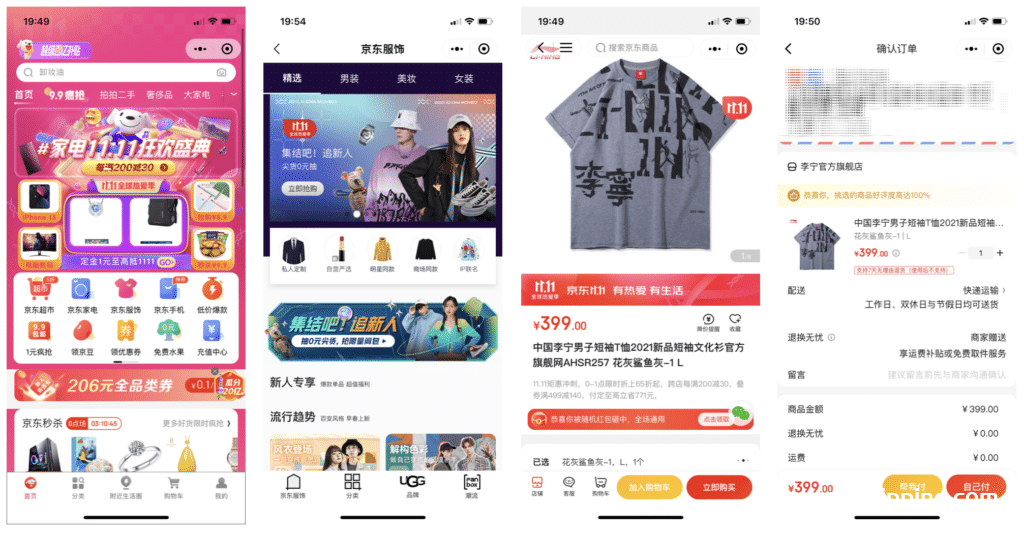
Mini-programs continue thriving in China’s digital ecosystem. Up to 2021, there are more than 4.3 million WeChat mini-programs attracting around 410 million daily active users. WeChat mini-programs are a very complex piece of technology/design, so I’ll answer the questions in 3 parts:
WeChat mini-programs are “sub-applications” within the WeChat ecosystem.
They enable to provide advanced features to users such as e-commerce, virtual store tour, task management, coupons, and other services.
Here are a few examples of WeChat mini programs.
JD.com (the second largest B2C e-commerce platform in China) has developed an e-commerce mini-program:

During Covid-19, local governments have leveraged mini-programs to control the spread of the pandemic: real-time health QR codes, record PCR test results, request or register vaccination, Q&A, etc:
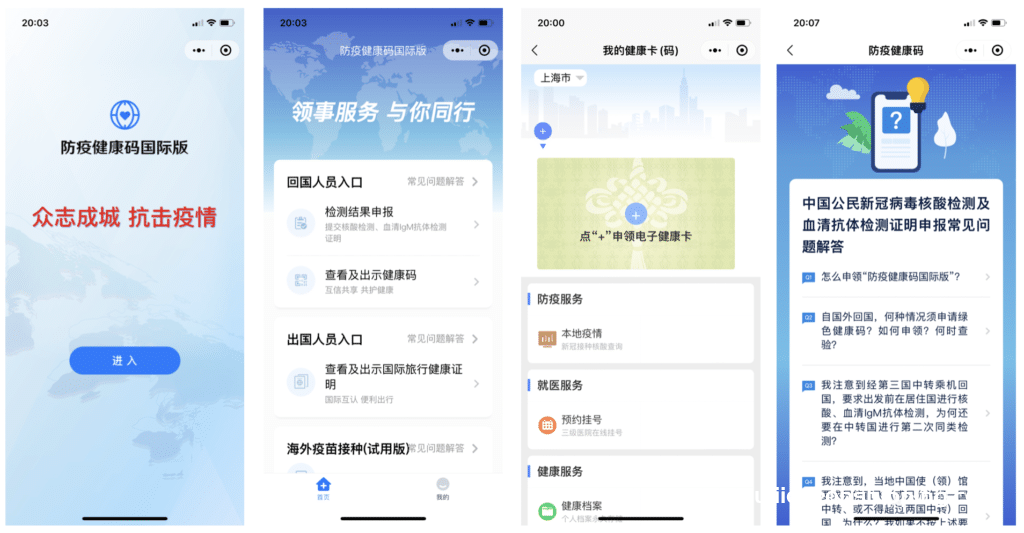
Farfetch has also made their presence on mini-program, enabling users to browse the brands and purchase products as if they were in Farfetch App:
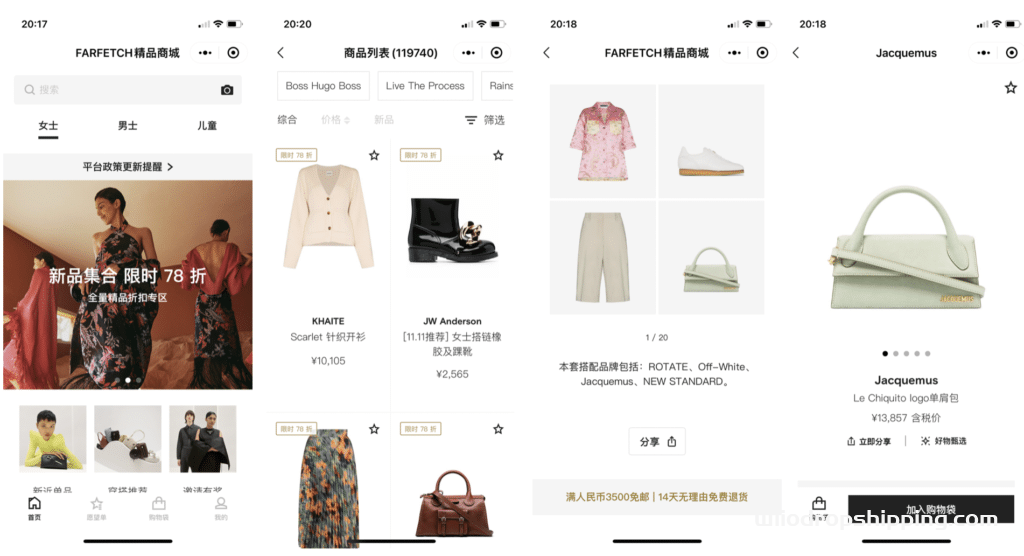
Because these experiences are built completely within WeChat, they are usually very fast (in terms of loading speed) and smooth (in terms of UX, integration with WeChat features and navigation)
You have many ways to access the WeChat Mini Program.
The most popular way is you can swipe down on WeChat to access a list of saved or recently used Mini Programs. According to Youzan, a WeChat shop platform, 27% of Mini Program traffic comes from this swipe down the interface.

This is a major step WeChat took in positioning its self as an operating system. Most businesses no longer need to launch an App, a WeChat Mini Program will do the work.
Users can also access to Mini Program via:
And according to Youzan, here is the major traffic source of WeChat Mini Programs:
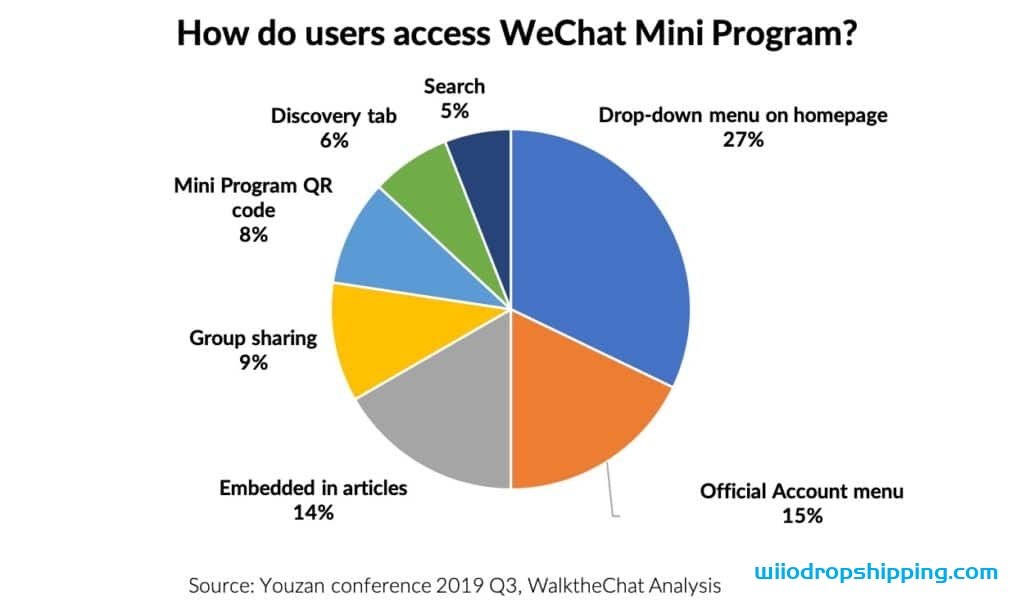
Although the overall time user spends on WeChat is decreasing, WeChat Mini Program is still a promising channel, especially for verticals such as service and eCommerce. According to ALD analysis, WeChat Mini Program GMV has reached 2000 billion CNY (approx. 310 billion USD), increasing by 67% compared to 2019.
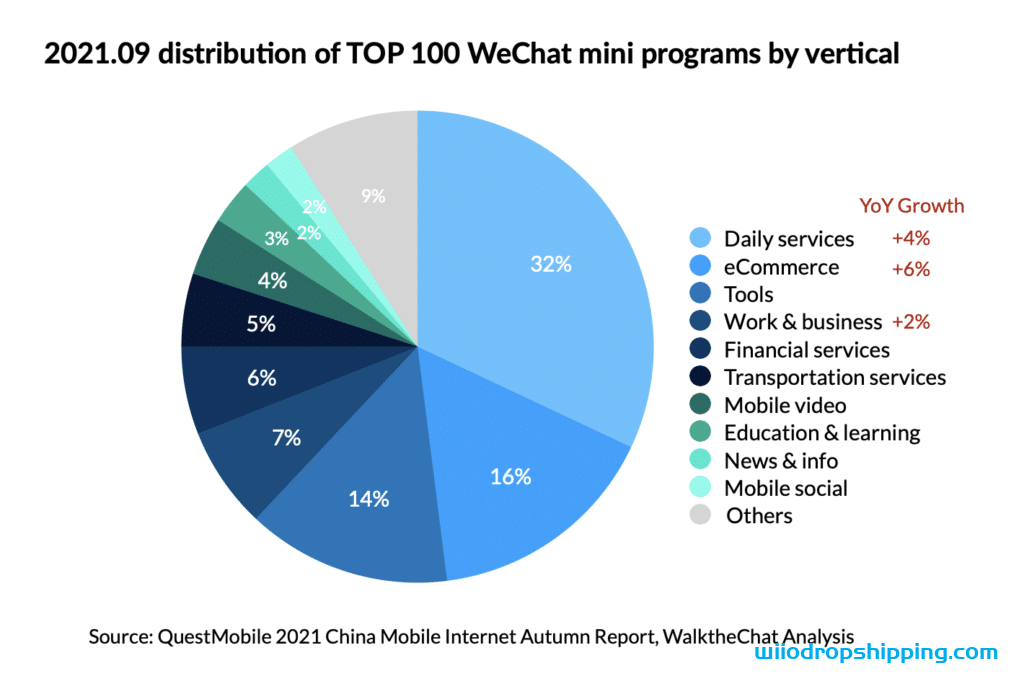
WeChat mini-programs are actually not as exciting as one might think.
It is indeed possible to access any web-App from within the WeChat browser. This means it’s already been many years that companies provide e-commerce and services via in-WeChat experiences, long before mini-programs were released.
Companies like eWashing (a dry-cleaning company taking orders via WeChat) have long managed to leverage WeChat has an App ecosystem (without using mini-programs):
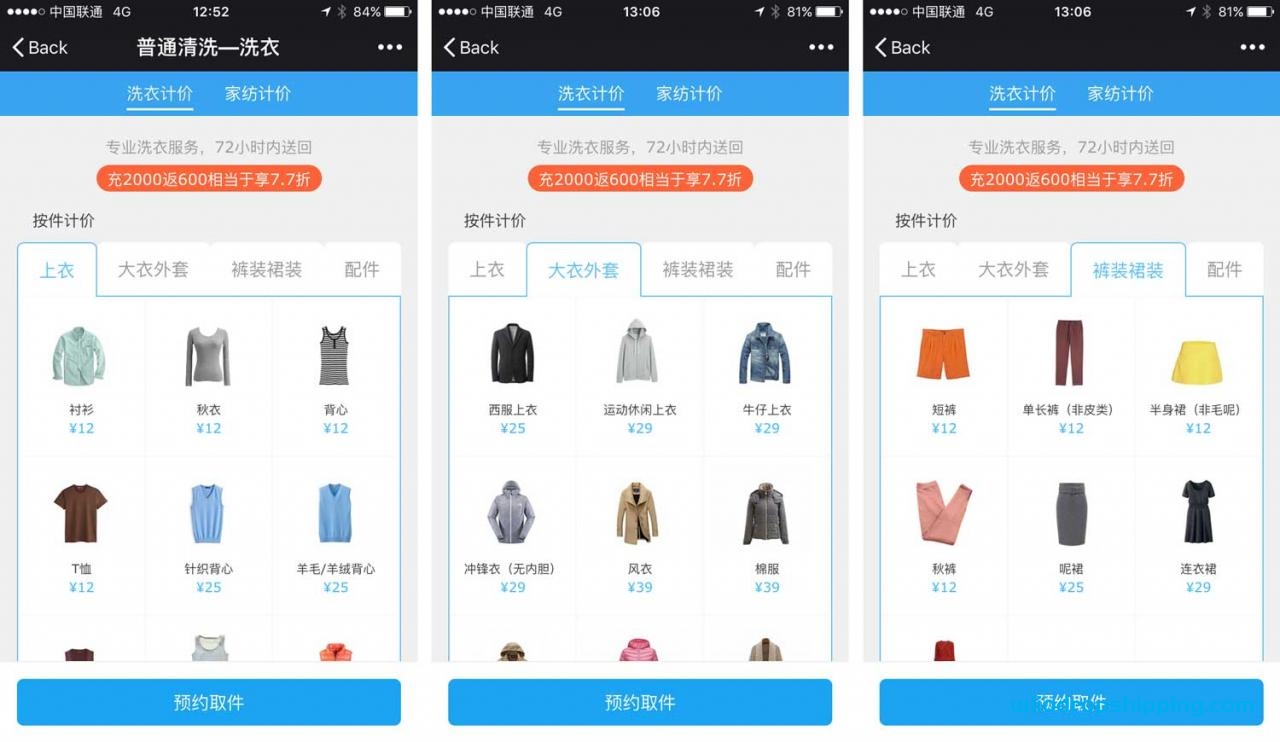
Many of these companies have so far stuck to these Web-Apps instead of switching to mini-programs. We’ll now explain why.
Mini-programs have many drawbacks as compared to web-Apps accessed within the WeChat browser:
That’s a long list of downsides. Yet, lately, mini-programs have started to gain traction. Why?
Over the last few months and weeks, the tide has been turning. Key Opinion Leaders such as Yu Xiaoge started to boast more than 1.5 million USD of monthly sales through their e-commerce mini-programs.
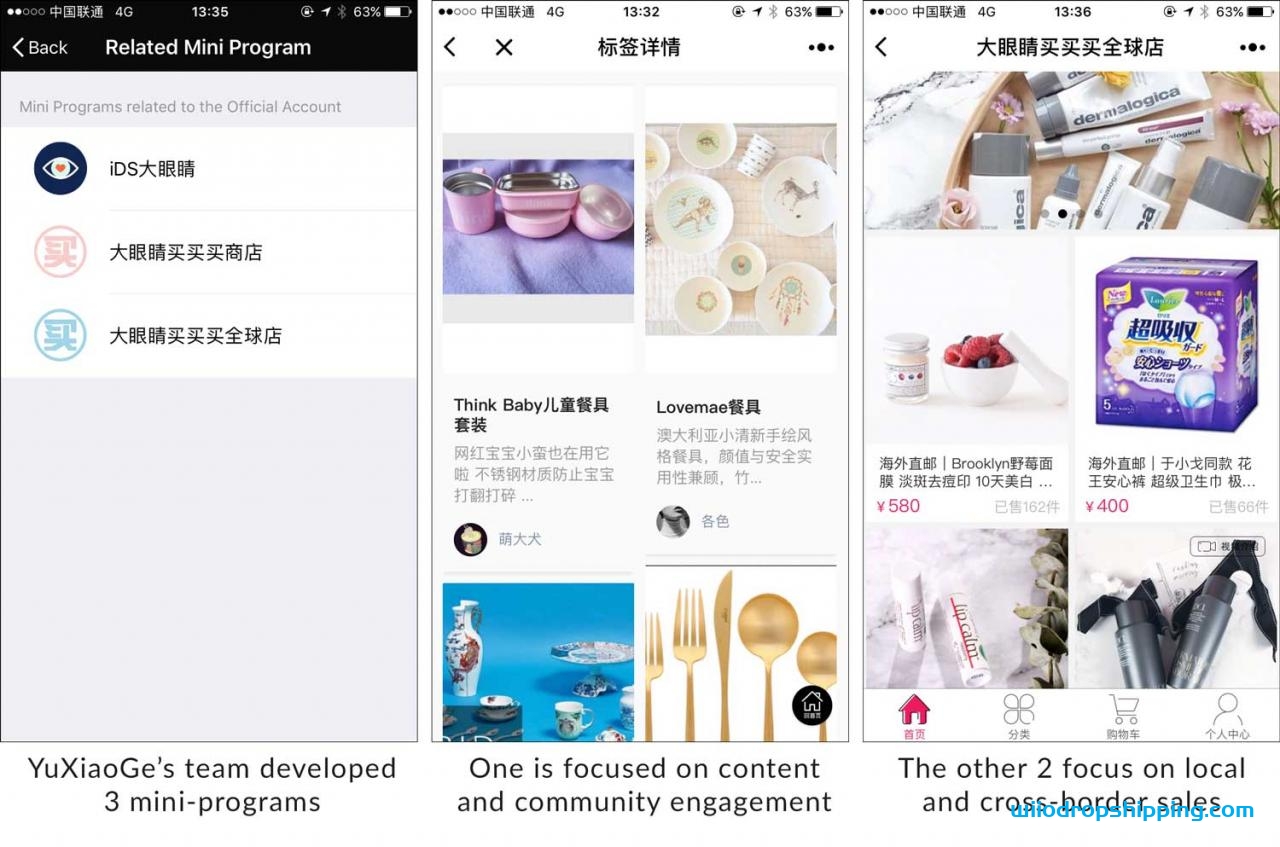
A growing number of top WeChat influencers started developing their own e-commerce and content mini-programs.
In order to understand the trend, we have to look into these influencer accounts in more detail.
WeChat has been the place where a striving community of influencers developed (partly due to specificities of the Chinese market, and partly due to the fact that WeChat advertising wasn’t that good at targeting customers).
These influencers became huge growth drivers for fashion, childcare and cosmetic brands. Their recommendations were extremely trusted by Chinese users, driving a huge amount of sales.
But there was one problem: influencers use WeChat Subscription Accounts (somehow equivalent to Facebook Pages) to send notifications, but the articles sent on these accounts can’t contain hyperlinks! It was therefore difficult for influencers to link to products in order to convert from content to e-commerce.
There came mini-programs, which conveniently solved this problem: WeChat made it possible to link from a Subscription Account article to a mini-program, increasing conversion rates.

And this is the true driver of recent mini-program growth: they enable much more dynamic navigation from WeChat Subscription Accounts (toward e-commerce or other pieces of content).
As such, they are not a really transformative piece of innovation but benefit from the “superpowers” that WeChat gave them, within their own walled garden.
Offline usage of WeChat mini-programs
Besides these e-commerce conversions, WeChat mini-programs also can be useful for offline use-cases. For instance, paying for gas at a gas station, or unlocking a shared bike.

As we speak to WalktheChat’s clients, a common question comes over and over again: are WeChat mini-programs a substitute for my native App?
The answer is: it depends on where and for whom. Let’s look at the data to break down this idea.
Official Accounts on WeChat were previously hindered by the inability to hyperlink products or services in WeChat. Now, with Mini Programs, accounts can send subscribers both notifications and link posts to Mini Programs.
One of the clear benefits is that users can access them within one app. This integration into China’s most-used app is a great opportunity for businesses of all sizes to reach their audiences. Additionally, they tend to run really quickly. They don’t use up precious data in downloads. They are also shareable in WeChat conversations between users, so there is much more opportunity that your customers can pass on information (and potential sales) to people they want to recommend to your business.
There are some drawbacks to using Mini Programs as opposed to browser-based web apps or even native apps themselves. Because they don’t need to be downloaded, they are small – this limits functionality. Unlike normal web-based apps that can work with any browser, these Mini Programs can only be used within WeChat.
For Mini Program development, it is important that creators are strictly adhere to Tencent’s guidelines, as Mini Program updates must be submitted to Tencent and programs can be blocked for violations. This is strict stuff, so you need to know what you are doing and tread carefully (this is actually true of most of the Chinese internet these days….)
Finally, although Mini Programs can be sent to individual or group chats, they cannot be shared on WeChat Moments (the equivalent of your Facebook wall) – so you can’t publicly share them for download on a “one to many” basis.
Despite the differences between Mini Programs and native or web-based apps, they do have their role in China’s market.
Due to the very nature of WeChat and its role in the the daily life of hundreds of millions of Chinese consumers, businesses should without doubt maximise exposure and reach on WeChat. WeChat mini-programs are not necessarily a substitute for native apps or web-based apps. Indeed, they are often used alongside other apps
For businesses using Official Accounts or other marketing tools on WeChat, Mini Programs are a simple and easy way to reach new audiences. Opening a Mini Program inside WeChat is a lot easier than downloading an app (think Facebook and all the little extras it has that keep you inside it’s own ecosystem – WeChat does the same with Mini Programs), and using a Mini Program is definitely an easy way for users to become familiar with your brand.
Mini Program development is relatively cheap and easy, especially in comparison to more sophisticated applications. While their current hallmark is simplicity, the growth in user-engagement and number of users is pushing Tencent to create more complexity within the Mini Programs.
Developing your Mini Program means you need some familiarity with the WeChat framework, and that’s where the 10,000 questions come in. If what you need is some more information on Mini Programs, then let us know, we’re using and building Mini Programs here in Beijing on a daily basis.
Leave us a comment, drop us an e-mail or a request for us to cover some topics in a future post.
Let’s do this….!